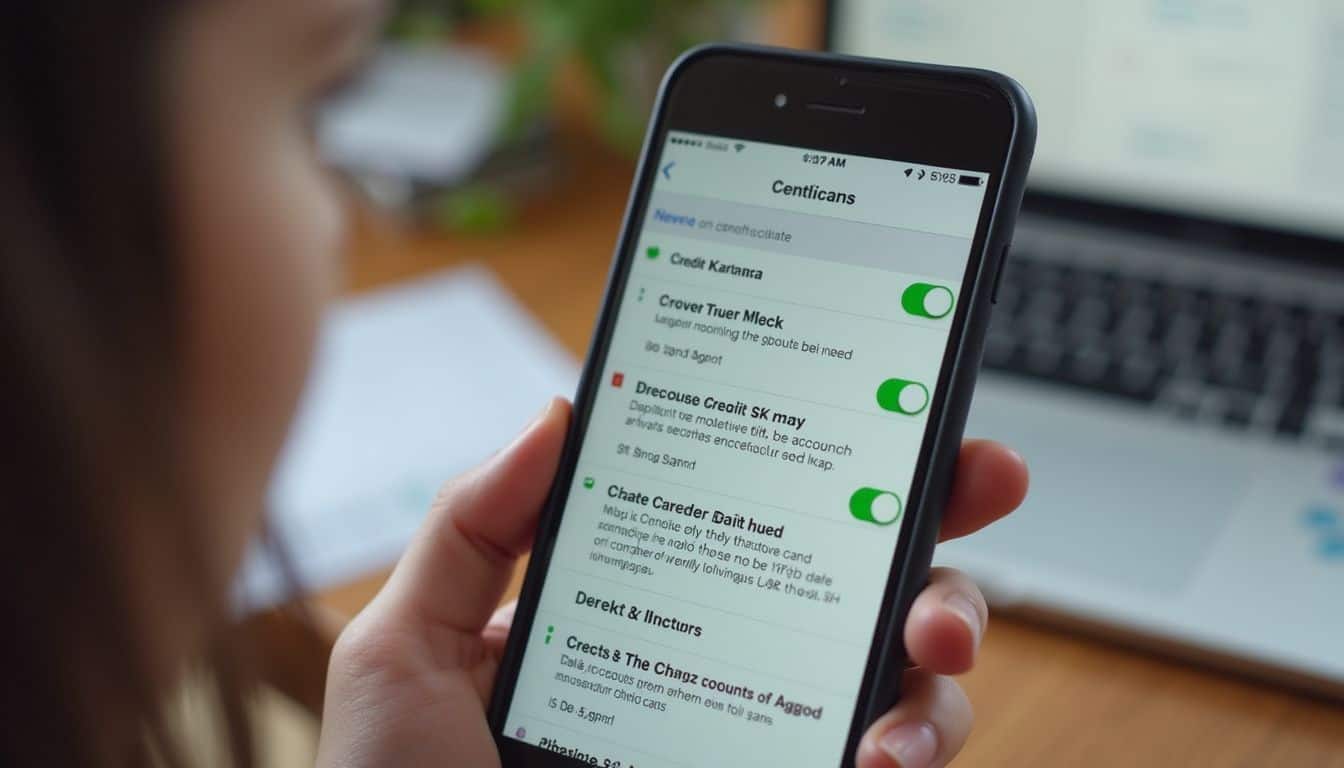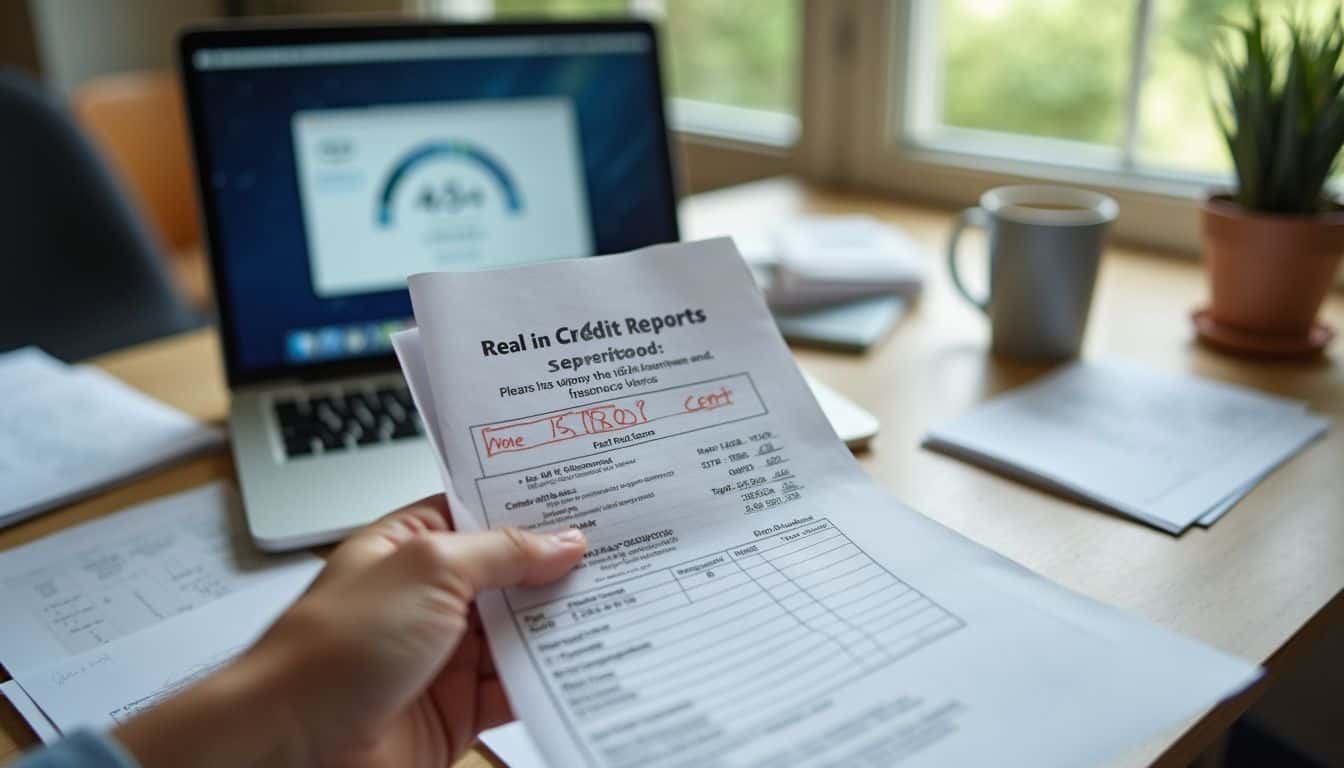Have you ever had that sinking feeling, wondering if someone could be opening a new credit card in your name? It’s a worry a lot of us have, especially when it feels like we hear about a new data breach every other week.
Deciding if credit tracking is worth it can feel like one more thing on a very long to-do list. But I found that thinking of it as a simple safety net for my financial health really changed my perspective.
Let’s walk through what these services actually do and figure out if one is right for you. I’ll show you everything you need to know, step by step.
Key Takeaways
Credit tracking sends you fast alerts about changes or potential fraud on your credit report. Services like Experian and Credit Karma can send notifications straight to your email or phone, giving you valuable peace of mind.
You have options. Free tools like Capital One CreditWise or getting your report from annualcreditreport.com are great starting points, though they usually only cover one credit bureau. Paid plans, like those from Aura, often cover all three bureaus and add powerful features like dark web scans and up to $1 million in identity theft insurance.
Some big changes are happening in 2025. Medical debt under $500 will be removed from credit reports, and mortgage lenders Fannie Mae and Freddie Mac will begin using VantageScore 4.0, making three-bureau coverage more important than ever for homebuyers.
Credit tracking isn’t foolproof. It can’t stop a thief from using your stolen debit card at a store or filing a fake tax return in your name. A particularly tricky type of scam called synthetic identity fraud can sometimes bypass even the best systems.
You can boost your own security for free. Simple steps like setting up transaction alerts with your bank, using a password manager like Dashlane or 1Password, and freezing your credit with Equifax, Experian, and TransUnion create strong barriers against fraud.
Table of Contents
What is credit tracking and how does it work?

Think of credit tracking as a security guard for your financial information. These services constantly watch your credit reports from the three major credit bureaus, Experian, Equifax, and TransUnion, for any changes.
You get alerts if someone opens a new credit card, applies for a loan, or even changes your address on an account. According to the Federal Trade Commission (FTC), there were over 1.1 million reports of identity theft in 2024 alone, making these early warnings incredibly valuable.
These services keep an eye on all your accounts, both open and closed. They look for changes in your credit limits, shifts in your FICO scores, and flag things like late payments. Catching these red flags early can be the difference between a quick fix and a massive headache. A 2024 report found that the average loss per victim of a scam was $1,600, showing how quickly things can escalate.
Many women use credit tracking to monitor everything from debts in collection to public records like bankruptcies. The alerts land right on your phone, so you’ll know immediately if a strange loan application pops up with Bank of America or Citi. Some services also offer helpful tips for improving your financial health or keeping tabs on a home equity line of credit (HELOC).
Keep one step ahead; don’t let identity thieves run wild with your Social Security number.
How does credit tracking monitor your credit?

Credit tracking keeps a close watch on your credit report through the main agencies: Experian, TransUnion, and Equifax. You’ll get a notification quickly if there’s a new credit check or anything suspicious happens with your FICO score.
How does credit tracking monitor changes to your credit report?

Credit tracking services watch your credit report for any changes, no matter how small. If someone opens a new account in your name, you get an alert. You might also see an email or phone notification if a lender checks your credit for a personal loan or home equity loan.
These alerts show up fast, helping you spot the early signs of identity theft or fraud.
The updates cover more than just new loans. A service can flag large purchases, changes to your address, or shifts in your credit limit with companies like American Express or Capital One. Many platforms connect directly with all three major credit reporting agencies, which means you stay informed about nearly everything that affects your FICO score or report.
Regular checks also tell you if your current accounts change status. This helps you catch problems before they grow into something much bigger, like a foreclosure.
How do alerts for suspicious activities work?

Alerts pop up quickly if a credit bureau spots something unusual, like your information being used for a new home equity loan you didn’t apply for. You might get an email, text, or app notification from services like Credit Karma or Identity Guard when there are changes on your report.
For example, you’ll be notified about new accounts, hard inquiries by lenders, and any updates to your personal information.
These warnings are crucial for catching fraud early. If someone attempts a credit card balance transfer using your Social Security number, you’ll see the alert before major damage is done. Most providers send alerts within minutes or hours of an activity showing up at one of the three major bureaus, giving you a head start to protect your finances.
How often do you get updates on your credit score?

The frequency of your credit score updates often depends on whether you’re using a free or paid service.
Free credit monitoring tools, like those from Credit Karma or Chase Credit Journey, typically provide updates weekly or monthly. They will also send an alert if a key change appears on your credit report. These services are great for casual monitoring.
Paid services often provide more frequent updates. Many premium plans from companies like myFICO or Experian offer daily credit score updates, so you can see changes almost as they happen. This is especially helpful if you’re actively working to improve your score or are in the process of applying for a major loan.
“Getting a quick alert felt like having digital eyes watching my back,” one user shared after catching fraud early through daily notifications.
Benefits of credit tracking services

Credit tracking helps you spot fraud fast, understand your FICO score and credit history, and can give you much-needed peace of mind. Let’s look at how it can fit into your life.
How does credit tracking help detect identity theft early?

Alerts from credit monitoring services flag changes in your credit file almost instantly. If someone opens a new loan or applies for a home equity loan using your information, you get notified within hours or days.
These alerts act like a smoke detector for your finances. With Americans losing over $12.7 billion to fraud in 2024, quick warnings help you freeze accounts before thieves can do more damage. Spotting strange activity early helps keep your FICO score from taking a major hit.
Some tools even scan the dark web to see if your Social Security number or bank details have been leaked in a data breach. I actually caught an unknown cell phone account opened in my name last year using free credit monitoring and was able to stop the damage before it got worse.
Curious about keeping funds safe between credit card vs debit card? Explore more tips now!
How can credit tracking improve your financial awareness?

Credit tracking gives you a real-time look at how your actions affect your credit score. If you miss a student loan payment, you’ll see the impact quickly, which can be a powerful motivator to stay on track.
Using a service like Credit Karma or getting your free report from annualcreditreport.com helps you spot errors or signs of identity theft before they can derail your goals, like getting a home equity loan.
I checked my report last year after an alert for activity I didn’t recognize. That one simple step saved me hours of dealing with credit card fraud. These tools break down what helps or hurts your score, so you can clearly see which habits are building a healthier financial future.
What insights can you get from your credit score and report?

Your credit score is like a trust badge for lenders. Mortgage brokers and banks look at your FICO Score to decide how reliable you are before approving you for a home loan or personal loans.
A single missed payment can cause your score to drop significantly. Your credit report shows every detail, from late payments to how much of your available credit you use each month. Spotting errors here can save you real money if you get them corrected.
There are also tools that can help you improve your score. For example, Experian Boost is a free feature that lets you add on-time payments for things like your cell phone, utilities, and even streaming services to your Experian credit file, which can sometimes give your FICO Score a nice lift.
One extra late payment can make your next home equity loan cost hundreds more in interest.
How does credit tracking assist with credit freezes and locks?

Credit tracking watches for changes to your credit report and sends alerts right away. These warnings make it easier to spot unusual activity, so you can quickly decide if you need to place a credit freeze or lock with the big three credit bureaus.
A credit freeze is a powerful, free tool that blocks creditors from accessing your credit report, which stops anyone from opening new lines of credit in your name. You must set up a freeze separately with each bureau: Experian, Equifax, and TransUnion. A freeze won’t hurt your FICO score.
A credit lock offers similar protection but is often a paid feature that you can toggle on and off instantly through an app. While freezes are protected by federal law, locks are a contractual service offered by the bureaus, so their terms can vary.
What identity theft insurance and fraud protection do credit trackers offer?

While a credit freeze is a great defense, sometimes thieves find other ways to cause trouble. This is where identity theft insurance comes in. Most paid credit monitoring plans include coverage, typically up to $1 million, to help you recover financially if someone steals your identity.
This insurance can be a lifesaver. It often reimburses you for expenses like:
- Lost wages from taking time off work to sort things out.
- Legal fees if you need an attorney.
- Costs for replacing documents like your driver’s license.
- Notary and postage fees.
Top services like Aura or LifeLock might even offer higher coverage amounts for families. Some plans from providers like ID Watchdog also monitor your home and car titles for fraudulent changes. It provides a sense of security to know you have that backup if the worst happens.
Free vs. paid credit tracking services

Not all free credit monitoring tools like Credit Karma or annualcreditreport.com show your true FICO score or help you spot every data breach. Let’s look at whether a paid service might be a better fit for you.
What features do free credit tracking services provide?

Free credit monitoring is a fantastic way for busy women to keep an eye on their credit without another monthly bill. These no-cost tools provide essential services and quick alerts so you can act fast.
- Score Updates: You’ll typically get score updates every week or month. For instance, Capital One CreditWise lets you check your VantageScore 3.0 from TransUnion anytime.
- Basic Alerts: Services like Experian’s free monitoring track your FICO Score and alert you to big changes, like late payments or new lines of credit.
- Identity Surveillance: Many free tools, like Chase Credit Journey, offer basic identity monitoring and will alert you if your personal info changes.
- Dark Web Monitoring: Some free services, including Capital One CreditWise, even include dark web monitoring to check if your Social Security Number has been exposed online.
- Helpful Tips: Most platforms provide educational content that explains what affects your credit score and how you can improve your financial health.
With free tools like these, staying informed and safe is much easier, no matter how hectic life gets.
What are the advantages of paid credit tracking services?

Paid credit monitoring services offer more powerful protection and a wider range of features. These extras can provide greater peace of mind and help you stay ahead of fraud.
- Three-Bureau Monitoring: This is the biggest advantage. Paid services like Aura and IdentityForce monitor your reports from all three major credit bureaus, giving you a complete picture.
- Deeper Security Tools: You often get advanced features like more comprehensive dark web monitoring and alerts if your data is found in a breach.
- Identity Theft Insurance: Most paid plans include insurance, often up to $1 million, to cover costs if your identity is stolen.
- FICO Score Access: Services like myFICO give you access to the various FICO scores that lenders actually use, which can be different from the VantageScore provided by free services.
- More Frequent Updates: Many paid plans offer daily updates on your credit score, so you can track changes in near real-time.
- Restoration Support: If you do become a victim of fraud, companies like Identity Guard provide dedicated specialists to help you restore your identity.
- Extra Digital Privacy Tools: Some plans bundle in other useful tools, like a VPN to keep your online activity private or a password manager to protect your logins.
How do the costs and benefits of free and paid services compare?

Free services like Credit Karma are an excellent starting point. They give you basic alerts and access to your credit score from one or two bureaus, which is often enough to catch major issues. The key thing to remember is they usually provide your VantageScore, not the FICO score most lenders use.
Paid options offer more comprehensive protection. For a monthly fee, you get deeper security features. The right choice really depends on your personal situation. If you’ve been a victim of fraud before or handle a lot of sensitive information, a paid plan can be a worthwhile investment.
Here’s a quick look at how they stack up:
| Feature | Free Services (e.g., Credit Karma) | Paid Services (e.g., Aura, myFICO) |
|---|---|---|
| Cost | $0 | $10 – $35+ per month |
| Bureau Monitoring | Usually 1 or 2 bureaus | Often all 3 bureaus |
| Score Type | VantageScore | Often includes FICO Score |
| ID Theft Insurance | Typically no | Yes, often up to $1 million |
| Dark Web Monitoring | Sometimes offered | Almost always included |
| Restoration Support | No | Yes, often with dedicated specialists |
What are the limitations of credit tracking?

Credit tracking is a powerful tool, but it’s important to know it can’t prevent every type of identity theft. Some scams can still slip through the cracks, even if you have a great service.
What can credit tracking not prevent?
A credit monitoring service is an alarm system, not an impenetrable fortress. It can’t stop a thief from making unauthorized withdrawals from your bank account or using your debit card at a store. It also won’t block someone from attempting credit card skimming at an ATM.
These services also don’t do the cleanup work for you. They won’t file a police report on your behalf or automatically correct errors on your credit report. If your information is stolen in a data breach, an alert can’t stop a criminal from trying to use it.
Furthermore, fraudulent tax returns filed in your name will fly under the radar of these services, as they don’t monitor your activity with the IRS. Think of monitoring as a way to get a critical heads-up, but you still need to be the one to take action.
Where are the gaps in fraud protection?
One of the biggest gaps is a sophisticated scam called synthetic identity fraud. This is where a criminal combines real information, like a stolen Social Security number, with fake details, like a made-up name and address, to create a brand-new, fake identity.
Because this new identity isn’t tied to a single real person, it can be very difficult for traditional fraud detection systems to catch. A fraudster might build up a good credit history with this fake identity over months or even years before maxing out all the credit and disappearing. This type of fraud is one of the fastest-growing financial crimes and can be very hard to trace.
What are alternatives to credit tracking?
If you’re not ready for a full tracking service, you have other powerful options. Tools like Face ID, password managers, and credit freezes can give you a ton of protection, often for free.
How can you self-monitor your credit for free?
You can absolutely keep a close eye on your credit without paying a cent. Your best resource is AnnualCreditReport.com, where you can get free weekly credit reports from all three bureaus: Experian, Equifax, and TransUnion.
Make it a habit to scan your monthly credit card and bank statements for any charges you don’t recognize. I also recommend setting up free transaction alerts with your bank. Most banks, like Chase and Bank of America, will let you set up notifications for any purchase over a certain amount, which is a great way to spot fraud instantly.
Using a budgeting app like Mint or a free service like Credit Karma can also give you regular access to your credit score. By checking in regularly, you can spot errors or suspicious activity early and take action right away.
How do credit freezes and locks work as alternatives?
Credit freezes and credit locks are two of the most effective ways to prevent new account fraud. Both of them stop lenders from accessing your credit report, which means a thief can’t open a new line of credit in your name.
- A credit freeze is a free, legally protected right. You have to request a freeze individually at each of the three bureaus (Equifax, Experian, and TransUnion). It’s incredibly secure but can take a business day or so to “thaw” when you need to apply for credit yourself.
- A credit lock is a service offered by the bureaus, often as part of a paid plan. The main benefit is convenience, you can instantly lock and unlock your credit report using an app. However, it doesn’t offer the same legal protections as a freeze.
Neither a freeze nor a lock will affect your FICO score. Just remember, they only block new accounts; they don’t prevent fraud on your existing credit cards.
How can digital security tools like VPNs and password managers protect you?
While a credit freeze protects your credit file, you still need to guard your personal information online. That’s where digital security tools come in.
A virtual private network, or VPN, from a service like ExpressVPN or NordVPN encrypts your internet connection. This is especially important when you’re using public Wi-Fi at a coffee shop or airport, as it prevents hackers from snooping on your activity and stealing your data.
Password managers, such as Dashlane and 1Password, are lifesavers. They create and store unique, complex passwords for all your online accounts in a secure digital vault. This means you only have to remember one master password, and it dramatically reduces your risk if one site you use has a data breach. Using these tools makes it much harder for thieves to get their hands on the information they need to commit identity theft.
How to choose the right credit tracking service

Picking a credit monitoring service feels a lot like finding the perfect pair of shoes, what works for someone else might not be the right fit for you. It’s all about matching the features to your personal financial needs.
How do you understand your financial needs?
First, think about your main money goals. Are you planning to buy a house in the next year? Are you focused on paying down debt? Or are you simply looking for a safety net against identity theft?
Your goals will help you decide what features matter most. If you’re applying for a mortgage, you’ll want a service that provides your FICO scores from all three bureaus, since that’s what lenders will be looking at. If your main concern is fraud, then features like dark web monitoring and identity theft insurance are more important.
Also, consider your personal risk level. According to the Federal Trade Commission, your risk can be higher if your personal information has already been exposed in a data breach. Knowing your priorities will help you choose a service that gives you what you need without paying for extras you won’t use.
How do you evaluate features and coverage?
When you’re comparing services, the first thing to check is how many credit bureaus they cover. The best protection comes from services that monitor all three: Equifax, Experian, and TransUnion. Monitoring just one bureau can leave you with significant blind spots.
Next, look for instant alerts for suspicious activity, like someone trying to open a new credit card in your name. Regular credit score updates are also important. I find that weekly or even daily updates are much more useful than monthly ones.
Finally, always read the fine print for hidden fees or difficult cancellation policies. Compare free platforms like Credit Karma with paid options that offer extras like dark web monitoring and identity theft insurance. The goal is to find the best value, a service that provides the protection you need at a price that makes sense for you.
Why is three-bureau monitoring important?
Many free credit monitoring services only watch one bureau, like Experian or TransUnion. This can create blind spots, because not all lenders report to all three bureaus. A thief could open a fraudulent account that only shows up on your Equifax report, and you might not know about it for months.
Three-bureau monitoring, which is a key feature of most paid plans, closes these gaps by watching your files at Equifax, Experian, and TransUnion simultaneously. This helps you spot errors or potential identity theft much faster, no matter where it first appears.
With big financial decisions like getting a mortgage hanging in the balance, having a complete view of your credit is crucial for protecting your FICO score and your peace of mind.
How will credit tracking change in 2025?
The world of credit is always changing, and 2025 is bringing some significant updates that will affect how your credit is reported and scored.
One of the biggest positive changes is how medical debt is treated. As of 2025, medical collection debt under $500 will no longer appear on your credit report. Paid medical collections are also removed, and any unpaid medical bills get a one-year grace period before they can be reported. This is a huge relief for anyone who has dealt with unexpected medical expenses.
For homebuyers, Fannie Mae and Freddie Mac are set to begin using VantageScore 4.0 for mortgage underwriting. This new model will look at trended data, meaning it considers your credit behavior over time, not just at a single moment. This shift could be a big deal for locking in better interest rates.
We’re also seeing “Buy Now, Pay Later” services like Afterpay and Klarna starting to report payment histories to the credit bureaus. While not all FICO score models include this information yet, it’s a trend that’s likely to grow. With all these shifts, staying on top of your credit report is more important than ever.
People Also Ask
What is credit monitoring, and how does it help protect against identity theft?
Credit monitoring services watch your credit reports at the three main bureaus, Equifax, Experian, and TransUnion, for signs of identity theft. They send you fraud alerts for suspicious activity, such as a new credit card application or a hard inquiry you didn’t authorize, so you can act fast. This early warning can be key to stopping financial fraud before it causes major damage.
Is free credit monitoring enough, or should I pay for extra services?
Free services like Credit Karma are great for basic score tracking, but paid plans from companies like Aura or IdentityGuard offer more complete protection. These often include three-bureau monitoring, dark web scanning for your personal information, and up to $1 million in identity theft insurance. A paid service can be a smart choice if you’ve been part of a data breach or want maximum security.
How do I check my FICO score without hurting my chances with lenders?
You can get your free credit reports from all three bureaus at annualcreditreport.com, the official site authorized by federal law, without impacting your credit score. Checking your own report is considered a “soft pull,” which lenders can’t see and does not affect your score. Many credit card providers also offer free FICO score updates to their customers.
Can tracking my credit really help me catch problems early?
Yes, regularly checking your credit report is the fastest way to spot and dispute errors or fraudulent accounts that could harm your financial health.
What happens if I spot something fishy while tracking my report?
If you see an account you don’t recognize or incorrect information, you should immediately place a free credit freeze with each of the three bureaus, Experian, Equifax, and TransUnion. This action restricts access to your credit file, making it much harder for someone to open a new account in your name. You can then file a dispute with the credit bureau and report the identity theft to the FTC.
Does using these tools make getting approved for things like money market accounts easier?
Keeping an eye on your credit score shows lenders you manage your finances responsibly, which can help you get approved for loans and credit cards with better terms. A higher score often leads to a lower annual percentage rate, saving you money on everything from car loans to mortgages. This practice is supported by the Fair Credit Reporting Act, which ensures information is accurate for both you and the financial institutions.
References
https://www.nerdwallet.com/finance/learn/credit-monitoring-identity-theft-monitoring (2025-04-17)
https://www.experian.com/credit/credit-monitoring/
https://www.unclecu.org/monitoring-credit/
https://www.cnbc.com/select/credit-monitoring-vs-credit-freeze/ (2023-01-24)
https://www.forbes.com/advisor/personal-finance/best-identity-theft-protection-services/ (2025-09-16)
https://www.bankrate.com/personal-finance/credit/credit-monitoring-when-is-it-worth-paying-for/ (2024-10-31)
https://gdslink.com/the-hidden-gaps-in-fraud-prevention/ (2025-03-11)
https://www.aura.com/learn/credit-monitoring-service (2025-03-27)
https://www.nerdwallet.com/finance/learn/credit-lock-and-credit-freeze (2025-05-23)
https://www.aura.com/learn/credit-lock-vs-credit-freeze
https://www.security.org/digital-safety/ (2025-07-22)
https://www.chartway.com/post/your_2025_credit_playbook_small_changes_big_impact.html?psrc=788 (2025-08-19)


